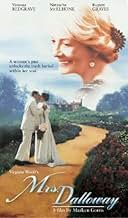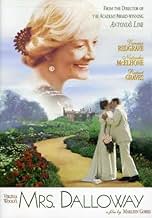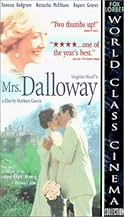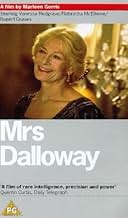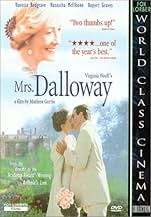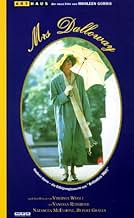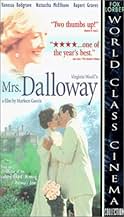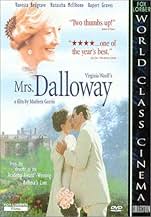VALUTAZIONE IMDb
6,5/10
4443
LA TUA VALUTAZIONE
Clarissa Dalloway, un'attempata signora di Londra, riflette riguardo la propria vita e sulle decisioni prese ingenuamente.Clarissa Dalloway, un'attempata signora di Londra, riflette riguardo la propria vita e sulle decisioni prese ingenuamente.Clarissa Dalloway, un'attempata signora di Londra, riflette riguardo la propria vita e sulle decisioni prese ingenuamente.
- Regia
- Sceneggiatura
- Star
- Premi
- 2 vittorie e 1 candidatura in totale
Recensioni in evidenza
10anelson1
Everyone doesn't like everything, so I'm not surprised that some people find the movie of Mrs. Dalloway boring. They probably would find the book boring too. But it's depressing. So they won't agree with some of us who see the novel as one of the great works of the 20th century, and the film as a truly remarkable and beautiful capturing of it. The only touch I regretted was the opening of the film with the Septimus Warren-Smith war scenes. The opening really belongs with Mrs. D. and her first words, "I will buy the flowers myself." After that moment, it's a quiet day but a beautiful and sensitive one.
In 1923 London, socialite Clarissa Dalloway (Vanessa Redgrave) is planning a high class party. She is the wife of MP Richard Dalloway. Her daughter Elizabeth prefers do-gooder Miss Kilman than her. Her old suitor Peter Walsh arrives with a troubled love life and various failures. Meanwhile, former soldier Septimus Warren Smith (Rupert Graves) is haunted by the nightmarish Great War. His wife Rezia is concerned. The movie also flashbacks to a young Clarissa (Natascha McElhone), a young Peter, and best friend Sally (Lena Headey).
This is adapted from a Virginia Woolf novel. The Septimus side of the story is separated from Clarissa for most of the movie. That kept me at an arm's length as I waited for the two sides to come together. While interested in Septimus, it seems to repeat the same premise. He would be better to be in his own movie about a shell shocked veteran. When the sides finally collide, it's not as compelling as one wish. Of course, it's still interesting as a character study for Clarissa. It may work better in literary form. As for young Clarissa, I'm more interested in Sally than Peter. It may be salacious but that counts. Vanessa Redgrave is able to maintain interest for the most part. I can't say that this is exciting or thrilling in any way. She's a marginally interesting character.
This is adapted from a Virginia Woolf novel. The Septimus side of the story is separated from Clarissa for most of the movie. That kept me at an arm's length as I waited for the two sides to come together. While interested in Septimus, it seems to repeat the same premise. He would be better to be in his own movie about a shell shocked veteran. When the sides finally collide, it's not as compelling as one wish. Of course, it's still interesting as a character study for Clarissa. It may work better in literary form. As for young Clarissa, I'm more interested in Sally than Peter. It may be salacious but that counts. Vanessa Redgrave is able to maintain interest for the most part. I can't say that this is exciting or thrilling in any way. She's a marginally interesting character.
Like most of Virginia Woolf's literary output, I appreciated the film-version of "Mrs. Dalloway" more than I enjoyed it. There are flashes of blinding beauty in this movie, however, the film's "sum" is not equal to its "parts". Of course, Vanessa Redgrave continues to astound me with her talent. And ---yes, the film is beautifully made and attention to period detail is evident. And --- yes, parts of the story are very heart-rending. Yet.... why does this film satisfy me but not move me? Like a guest at one of Mrs. Dalloway's parties, I am more impressed with the effort that went into the production than the product itself.
I appreciate this film for its technical quality, as well as its ambition in trying to film a novel that is written in the stream of consciousness style, however it fails overall because of Ms. Redgrave's performance. Her acting destroys the tone of the movie in a extremely jarring way; the contrast between her just-swallowed-a-bottle-of-Prozac happiness and the other plot lines and draws the viewer out of the experience of the film. The novel's tone is much darker and Clarissa's point-of- view much more based on regret, and more in sync with the post-traumatic-stress and depression of Septimus and the ennui and disenfranchisement of her daughter. Her performance wasn't only in the wrong tone, but it was incredibly phony; a viewer should never see acting happening. This is the same gripe I have with Rupert Grave's performance of Septimus; his acting is too stagy and I never truly believed him when shouting "EVANS! EVANS!"
Probably will be (and perhaps should be) the last time a film adaptation is made of this novel.
Probably will be (and perhaps should be) the last time a film adaptation is made of this novel.
I doubt that any film version of "Mrs Dalloway" can convey the breadth, depth, complexity, and radical vision of Virginia Woolf's novel. Although Gorris's version of it does seem to surpass typical expectations--and can stand on its own right as a rare adult character study movie, it still lacks Woolf's punch when it comes to dealing with her raw reality, her human presences, and her attacks on the bloodless psychiatric profession. Gorris is mainstream saddled, but more critically, she's limited by images that cannot take the measure of either the experimental content or more committed thoughts which only written forms can account for. For instance, there are more generics in the movie version, more single note characters and situations. And while Clarissa Dalloway and Septimus Warren Smith are the exclusive possessors of embodied consciousness and memory in the movie, this is hardly the case with the book.
I guess to comprehend what's going on (not easy because the movie's past--a simultaneous time period, seems a bit arbitrary, and character physical mismatches are not helpful) it's important to know that Woolf herself led something of a double life. Socially, she tended to hover on the surface as more of a performer or entertainer--and thus the "snob" epithet that is oft hurled her way; but privately she was, of course, the deeply conscious writer and thinker plagued with recurring mental illness, attempted suicides, and marriage upheavals which were so critical to the self she understood to be both real and dark.
Woolf wrote "Mrs Dalloway" as perhaps both an escape from her more tormented self and from the fashion of post-war disillusionment. Indeed, Mrs. Dalloway, the vibrant, party-loving social mediator, who Woolf herself, if not for certain life turns, could have become, initially stood alone in Woolf's novel. But this sunny version could not be tolerated. For Woolf, the writer, knew and understood too much of reality, too much of the war's devastation, too much of the underclass, and too much of the ice cold world of psychiatry, to let the party woman Clarissa's vibrancy take hold. Septimus Warren Smith was introduced to the novel not only as her counter figure, but also as a crucial part of Mrs Dalloway's consciousness without which she would be too glib, too shallow, too lacking in a sense of self.
One telling example of how the movie cannot handle the novel's radicalism is its take on Septimus Warren Smith's guilt. Gorris offers Smith's hallucinogenic encounters with Evans, which are both gripping and melodramatic, as the obvious causation (shell-shock) of his mental breakdown. But in Woolf's text what's more at stake for Smith is his emotional abandonment of his Italian wife, Rezia. Septimus, his war traumas not withstanding, exerts his own form of trauma onto his wife. It's this act of dehumanization, more personal than war, in which he shuts down communication with and discards his only ally, that drives his guilt. This is not a false self-blame, but a true self -blame, and a true guilt. But that such disengagement is socially acceptable and thus totally outside the narrow scope of his acquisitive, neurosis-classifiers psychiatrists, who deny any bitter complexities, only compounds his madness. So, Septimus' productive guilt, which should be most amenable to treatment, gets stifled by a power-based professional elite. And who understood this perverse, anti-human corps of experts better than Virginia Woolf, the writer, and author of the novel "Mrs. Dalloway," who was also thought to be lacking in proportion, and unable to adjust.
I guess to comprehend what's going on (not easy because the movie's past--a simultaneous time period, seems a bit arbitrary, and character physical mismatches are not helpful) it's important to know that Woolf herself led something of a double life. Socially, she tended to hover on the surface as more of a performer or entertainer--and thus the "snob" epithet that is oft hurled her way; but privately she was, of course, the deeply conscious writer and thinker plagued with recurring mental illness, attempted suicides, and marriage upheavals which were so critical to the self she understood to be both real and dark.
Woolf wrote "Mrs Dalloway" as perhaps both an escape from her more tormented self and from the fashion of post-war disillusionment. Indeed, Mrs. Dalloway, the vibrant, party-loving social mediator, who Woolf herself, if not for certain life turns, could have become, initially stood alone in Woolf's novel. But this sunny version could not be tolerated. For Woolf, the writer, knew and understood too much of reality, too much of the war's devastation, too much of the underclass, and too much of the ice cold world of psychiatry, to let the party woman Clarissa's vibrancy take hold. Septimus Warren Smith was introduced to the novel not only as her counter figure, but also as a crucial part of Mrs Dalloway's consciousness without which she would be too glib, too shallow, too lacking in a sense of self.
One telling example of how the movie cannot handle the novel's radicalism is its take on Septimus Warren Smith's guilt. Gorris offers Smith's hallucinogenic encounters with Evans, which are both gripping and melodramatic, as the obvious causation (shell-shock) of his mental breakdown. But in Woolf's text what's more at stake for Smith is his emotional abandonment of his Italian wife, Rezia. Septimus, his war traumas not withstanding, exerts his own form of trauma onto his wife. It's this act of dehumanization, more personal than war, in which he shuts down communication with and discards his only ally, that drives his guilt. This is not a false self-blame, but a true self -blame, and a true guilt. But that such disengagement is socially acceptable and thus totally outside the narrow scope of his acquisitive, neurosis-classifiers psychiatrists, who deny any bitter complexities, only compounds his madness. So, Septimus' productive guilt, which should be most amenable to treatment, gets stifled by a power-based professional elite. And who understood this perverse, anti-human corps of experts better than Virginia Woolf, the writer, and author of the novel "Mrs. Dalloway," who was also thought to be lacking in proportion, and unable to adjust.
Lo sapevi?
- QuizFirst screenplay written by Eileen Atkins.
- BlooperIn the flashback scenes with the younger actors, Peter is slightly taller than Clarissa. When they dance together at the party, he is considerably shorter than her.
- Citazioni
Peter Walsh: [Talking about Clarissa in 1923] She broke my heart, and you can't love like that twice.
- Colonne sonoreTime for Old Time
Composed by Jack Trombey (as J. Trombey)
I più visti
Accedi per valutare e creare un elenco di titoli salvati per ottenere consigli personalizzati
- How long is Mrs Dalloway?Powered by Alexa
Dettagli
- Data di uscita
- Paesi di origine
- Lingua
- Celebre anche come
- Mrs Dalloway
- Luoghi delle riprese
- Duke of York Column, St James's, Londra, Inghilterra, Regno Unito(Mrs Dalloway coming back from shopping flowers)
- Aziende produttrici
- Vedi altri crediti dell’azienda su IMDbPro
Botteghino
- Lordo Stati Uniti e Canada
- 3.309.421 USD
- Fine settimana di apertura Stati Uniti e Canada
- 90.127 USD
- 22 feb 1998
- Lordo in tutto il mondo
- 3.309.421 USD
- Tempo di esecuzione
- 1h 37min(97 min)
- Colore
- Mix di suoni
- Proporzioni
- 1.85 : 1
Contribuisci a questa pagina
Suggerisci una modifica o aggiungi i contenuti mancanti


